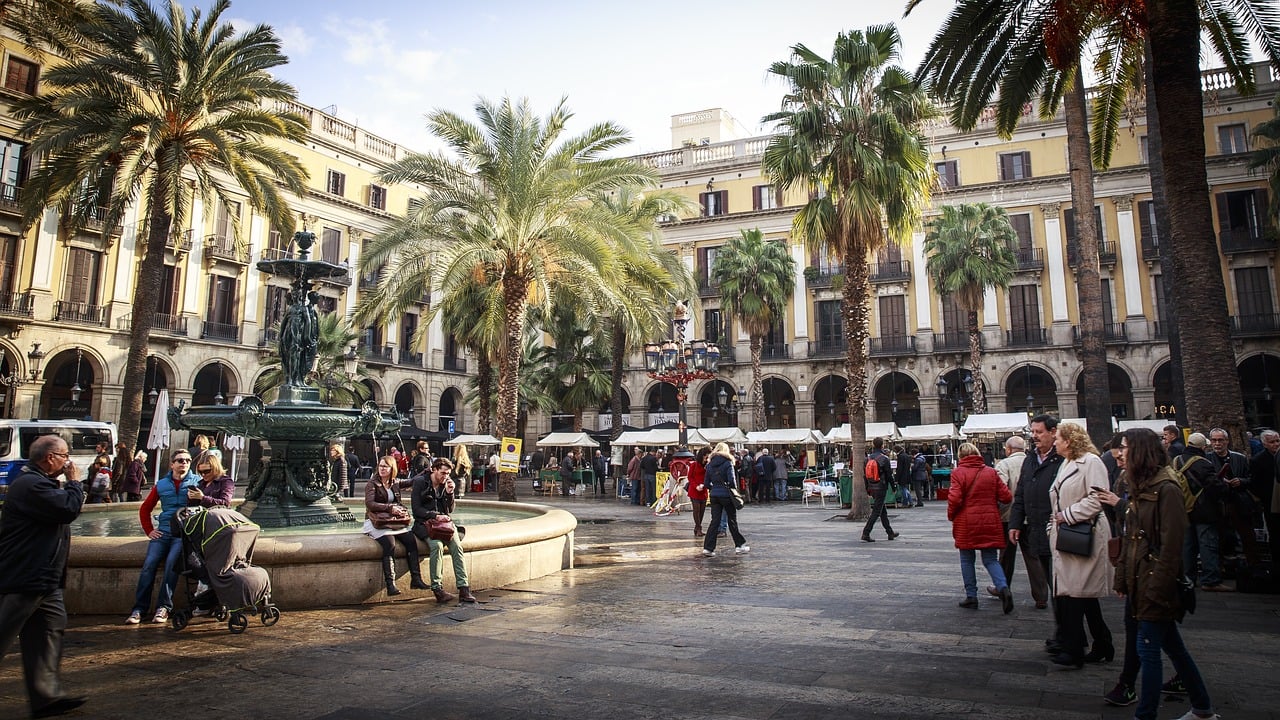Catalonia has been covered in the media quite a lot recently due to the “el procés,” i.e. the struggle for independence and attempts to establish independent, sovereign Catalan Republic.
Is supporting the right of self-determination disrespectful for those who do not want to leave Spain.
The debate on whether Catalonia should or should not secede from Spain has raised the recurrent and demanding question for libertarians: is it “libertarian” to support this particular secessionist process, knowing that the group wanting to secede does not necessarily seek to build a free market and libertarian paradise in the north-eastern part of the Peninsula? Furthermore, is supporting the right of self-determination disrespectful for those who do not want to leave Spain, but live in Catalonia? Is there any “libertarian” solution to this Catalan puzzle? I will show that there is one called “enclavization.”
The Ongoing Dispute
Snap elections in Catalonia, held on Thursday 21st of December after dismissing the Catalan government (Generalitat) according to the article 155 of the Spanish Constitution, was the Spanish central government’s response to the Unilateral Declaration of Independence passed on the 27th of October by the Parliament of Catalonia, which was about to bring the Catalan Republic to life. Spanish authorities, from the very beginning of “el procés” claiming that Generalitat’s actions regarding the issue in question, i.e. independence referendum on the 1st of October and UDI following it, were unconstitutional and illegal.
With the intention of reestablishing the rule of law, legality, and stability in the Autonomous Community of Catalonia, the cabinet of the Spanish prime minister Mariano Rajoy decided to “make things right” and prove to the Catalan secessionists and to the whole world, that mayoría silenciosa, silent majority in Catalonia, do not want to secede and that pro-independence parties are in fact coupists (golpistas) willing to disintegrate Spanish State and force millions of people to leave it against their will.
In order to prove his point, on the very same day when members of the Catalan Parliament voted in favor of the Declaration of Independence, Rajoy and the unionists supporting his actions regarding Catalonia ordered in the Spanish Senate that there will be legal, transparent (but without any single international observer), and fair elections to the new Catalan Parliament, where – as Rajoy and unionists were hoping – pro-independence parties will no longer have an absolute majority of the seats, and it will be impossible for them to continue their struggle for independence. Unity of Spain was about to be secured and defended. Unity of Spain was about to be secured and defended.
Additionally, aforementioned steps undertaken by the Spanish government were seen as a direct reply to the disputed independence referendum whose results were seen by the members of the Catalan Parliament as a mandate to declare independence from Spain. Snap elections were about to be a clear, legal, fair, constitutional, and democratic response to the independence referendum, which – as many people claimed – was not democratic, nor legal, nor within the “democratic standards,” since there was no eligible voters registry, many people voted more than once or in more than one polling station etc.
This is obviously true: the referendum was held outside the Spanish law, incidents like those mentioned did occur, and everyone will agree that they should not have taken place. Yet one cannot forget what happened on the 1st of October, particularly the brutality of the Spanish Guardia Civil police armed forces who used violence against peaceful voters, against people who only wanted to express their will regarding the future of their country by casting a ballot, which in the eyes of the central government deserved a punishment. But let us just leave it all behind and focus on what actually happened just before Christmas.
The Election Results
As the opinion polls suggested, snap elections were won by the Ciutadans (Citizens, C’s) right-wing party, which got 37 out of the 135 seats. However, 70 of them were taken by the pro-independence parties: Junts per Catalunya (Together for Catalonia, JxCAT), Esquerra Republicana de Catalunya (Republican Left of Catalonia, ERC), and Candidatura d’Unitat Popular (Popular Unity Candidacy, CUP).
Pro-independence parties won these snap elections despite many major obstacles.
Eventually, the result was pretty clear: unionist 57, secessionists 70. Thus the pro-independence bloc upheld its absolute majority, since what they needed was 68 diputats, and showed that they are still backed by more people than the unionist parties or by those skeptical about the idea of secession and independent Catalonia. Furthermore, pro-independence parties won these snap elections despite many major obstacles, not to mention the fact that two leaders of the two biggest secessionist parties – Carles Puigdemont and Oriol Junqueras – were in exile or in prison, respectively.
Although Inés Arrimadas’ party C’s will be the biggest one in the newly elected Parliament they will not be able to form a stable majority with the support of the Partit Socialista de Catalunya (Catalan Socialist Party, PSC) and the Partit Popular de Catalunya (People’s Party of Catalonia, PPC). Puigdemont, who leads the Generalitat, will either be fully restored, or imprisoned and exiled politicians will be replaced by their deputies. Clearly, it is not what the ruling Partido Popular (People’s Party, PP) expected. Summa summarum Rajoy’s government won nothing except some more time to deal with the Catalan independence issue. Frankly, the state of affairs is more or less the same as it was at the end of October if one puts the Presos Polítics (political prisoners) case aside.
Before I go into the analysis of the secession phenomenon, let me bring some more numbers regarding the snap elections in particular and the support for the pro-independence parties in general.
- The turnout is something worth mentioning: almost 82 percent of eligible voters cast their ballots, which makes the results of the snap elections even more reliable.
- In hindsight, pro-independence parties have been gaining votes which the snap elections results prove to be a trend: in 2012, 2015, and 2017 they gained the majority of the seats in the Parliament. During the unofficial independence referendum on 9th of November 2014 there were 1,897,274 in favor of secession; on 27th of September 2015 secessionists got 1,966,508 votes; on 1st of October 2017 they broke the 2 million votes threshold, since 2,044,038 of the participants of the independence referendum voted for secession; and on 21st of December they got as many as 2,063,361 votes.
- However, once again, secessionists were not able to gain more than 50 percent of the votes, making 47 percent of them, which can be a pretty sound and valid argument in the hands of the unionists that there are more than 50 percent of Catalans who do not support the secessionist agenda, which weakens the pro-independence parties mandate quite a bit.
Instead of bringing Spain closer to resolving the conflict regarding Catalonia’s case for independence the way the Spanish authorities wanted it to be, Rajoy de facto fuelled secessionist parties, nolens volens proving them right that there was and still are more people in Catalonia in favor of secession and establishing the independent Catalan Republic than there is those willing to keep the status quo. However, as I already pointed out, many people in Catalonia voted for the unionist forces since many of them do not want to leave Spain because they do not want to say, Adéu, Espanya!
When the society or a nation is so polarized that there is no vast majority of supporters of a given agenda — secession in this particular case — we will always have to face a serious and demanding question: how to defend rights and liberties of both of these groups with very different views on the future of their country? Should we side with one of them, sacrificing the rights and liberties of the other, or should we look for a win-win solution?
Perhaps We Could Try Enclavization
Although prima facie it may look like a hilarious proposal made by the Barcelona Via Fora platform: the idea of an autonomous or independent city of Barcelona. Or the latest one from Barcelona suggesting that the territory called “Tabarnia” (consisting of parts of the provinces of Tarragona and Barcelona), where — as the results of the snap elections showed — a lot of the inhabitants are, for many reasons, against being part of independent Catalonia, should be independent as well. These are, in fact, something pro-liberty and libertarian-minded people ought to be looking at.
If the people living in Tarragona believe that being part of the Catalan Republic is not in their vested interest, they should be free not to be part of it.
If the people living in the Barcelona area want to go their own way, siding neither with Catalan secessionists nor nationalists nor with the Spanish unionists, they should be free to make Barcelona an independent city, neither a part of Spain nor Catalonia. If the people living in Tarragona believe that being part of the Catalan Republic is not in their vested interest, they should be free not to be part of it. If secessionists really believe in the self-determination principle, they should be the strongest proponents of these. Is it something they are fighting for, namely a right to secede and to voluntarily separate from those with whom they are not willing to live in the same State under the same government? Small-scale secession, as Hans-Hermann Hoppe likes to put it, is what Spain, Catalonia, and Barcelona really do need.
How to solve the Catalan puzzle then? In order to resolve ongoing and possibly growing internal conflict in Catalonia, there should not be snap elections but a respected right of self-determination not only for secessionists but for unionists and anti-secessionists as well. Those who are willing to live in Spain should be free to make secession from Catalonia. The Catalan Republic should let those people go just as the Spanish government should let the Catalan secessionists go on their own in their newly established independent State. In other words, those willing to go should be free to go whilst those willing to stay should be free to stay.
Instead of taking Catalonia as a whole, as a single and indivisible entity, it should be partitioned according to the uti possidetis de facto rule: parts of the country of the size of the province, vegueria or comarca or even city and its districts where majority of the voters decided to vote for pro-independence parties should be granted permission to secede, and those areas and territories where majority of the voters backed unionist parties should have their right to remain as part of Spain respected. This is something I like to call “enclavization,” since it provides a mechanism to establish enclaves and exclaves inhabited by the so-called “nations by consent,” as Murray N. Rothbard coined it in one of his essays.
Opposing the one-dimensional and one-step secession process where we treat territories like Catalonia as a coherent, homogenous and single units, pro-liberty and libertarian-minded people should advocate enclavization which can facilitate voluntary separation as well as reduce tensions and conflicts arising after the possible secession of Catalonia from Spain within the newly established Catalan State.
If the inhabitants of Catalonia who disagree with their real estates and properties being forcibly seceded from Spain do not have their right to make yet another secession – this time from Catalonia – the whole struggle for the Catalan secession will end up being just a step on the long road towards more liberty and more freedom, an important step, but just a single step.
Przemysław Hankus
Przemysław Hankus is the Libertarian Association (Stowarzyszenie Libertariańskie) Chairman of the Board, PhD candidate at the Institute of International Studies, Faculty of Social Sciences at the University of Wrocław, Poland (field of studies: secessionist processes, international relations theory), author of several papers published in journals by the likes of The Secessionist Processes from Libertarian Perspective, amateur translator and journalist, bedroom DJ.
Follow him via Facebook; Twitter; his website.
This article was originally published on FEE.org. Read the original article.







